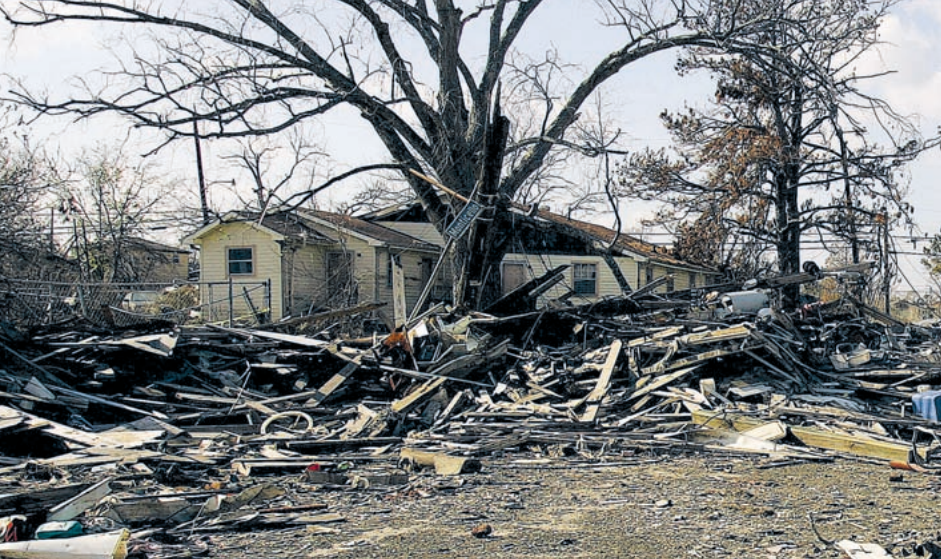Featured Projects

On 09, Jan 2006 | In Print Journalism | By erikgerman
Report from New Orleans: Can this neighborhood be saved?
For Newsday
Covering the aftermath of Hurricane Katrina for Newsday. For this piece, I interviewed victims still picking through the wreckage for a story on the fierce controversy over rebuilding New Orleans’ impoverished Lower 9th Ward.
Here’s the story:
NEW ORLEANS – The 24-year-old fashion designer with perfectly coiffed curls strode down a rubble-strewn street in the Lower Ninth Ward earlier this week, vowing to throw herself in front of any bulldozer that came to demolish her house.
“We’ll stand here and wait them out,” Delores Cager said, hoop earrings twisting as she gestured to the little blue house she once shared with her grandmother on Deslonde Street, a block from the levee breach that let Hurricane Katrina’s floodwaters drown the homes of some 20,000 mostly black, mostly working-class residents in September.
“I cannot leave. We will not go. And they cannot bulldoze our home,” Cager said.
Two weeks ago, city officials said they might demolish as many as 2,500 flood-damaged houses throughout New Orleans without the consent of homeowners, should those structures pose an imminent danger to the public. An additional roughly 3,000 homes throughout the city have been marked as unsafe to enter. Residents have said they saw city workers removing debris, some of which may have been remnants of damaged houses.
But Cager, who moved just before the hurricane, will not need to do battle with the bulldozers just yet. Several community groups and more than 50 Lower Ninth Ward residents recently filed a lawsuit alleging that the city’s presumed power to demolish homes was unconstitutional. On Thursday, U.S. District Judge Martin Feldman ordered a halt on all house demolition in New Orleans until Jan. 19.
But what remained unclear last week was how damaged a structure can be and still count as a house.
“What city officials and inspectors are going to do is make the determination at some point in time whether a home is still a home or if it has become rubble,” said Assistant City Attorney Franz Ziblich. “If it’s at all close, it’s not going to get demolished.”
Still, some former residents say they feel in limbo, and many dispersed homeowners are unable to return for belongings or are unaware of the need to do so before demolition crews scrape what remains into Dumpsters.
The wait is particularly anxious for residents of the Lower Ninth, where floods buffeted hundreds of homes into piles of wreckage and knocked out water and power to the rest of the neighborhood’s approximately 7,900 homes – according to 2000 U.S. census data – leaving them virtually unlivable.
“There was no process,” said evacuee Marietta Williams, 60, describing how hard it was to find information on the fate of her house. She now lives in Silver Spring, Md., with her son, and has been salvaging possessions while visiting relatives in Mississippi since Dec. 23.
“All you could do was watch CNN and hopefully Anderson Cooper would tell you something,” Williams said.
Some residents say the vastness of destruction has led them to give up and move elsewhere.
“Come back? Oh no. Lord,” said Rayceille McCullum, watching her husband search for tools amid the rubble in her back yard. Katrina filled McCullum’s house with mud, smashed her Lexus and ruined the Black Forest cuckoo clock her husband brought back from Germany in 1983. She and her husband have moved to Bay St. Louis, Miss., and have been back to New Orleans just twice on salvage missions.
“We made it through [Hurricane] Betsy [in 1965] and we aren’t going to do this again,” McCullum said.
Even some residents aiming to stay and rebuild say that some parts of the Lower Ninth must be cleared before construction can begin. “You can’t build a house on top of this garbage,” said Daryel Jones, 45, pointing to a rubble pile on North Derbigny Street. Jones, who has relocated temporarily to Houston, used to be a cook in the French Quarter and said he’ll return soon.
But first, he said, “This place has got to be bulldozed out.”
Download the PDF






